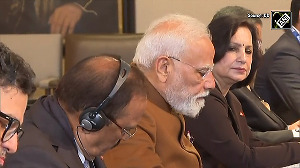Though Anil Ambani's Reliance Natural Resources Limited has won its battle with older brother Mukesh Ambani's Reliance Industries Limited, it may be a while before this translates into action on the ground.
The Bombay High Court has upheld RNRL's plea that RIL has to supply it 28 mmscmd (million standard cubic metres per day) of gas from its KG Basin field at the agreed price of $2.34 per mmbtu (million metric British thermal units) for 17 years, and not at the $4.20 that RIL had said the price should be -- a price sanctified by a Group of Ministers after some minor tweaking.
While upholding RNRL's petition, the court has given the two sides a month to sort out matters, including going back to the brothers' mother Kokilaben. If none of this works out, a lengthy battle in the Supreme Court is a near certainty because of the continuing state of war between the brothers.
For RIL, the judgment has massive implications since it means that the case which the public sector NTPC has filed against it could go the same way.
RIL had participated in an NTPC auction for the supply of 12 mmscmd of gas for 17 years, and won when it bid $2.34. If the two contracts are taken together, RIL would have to sell around half its production of gas at $2.34, a price that is significantly lower than the $4.20 that the government ratified.
If at the same time the government accepts the argument put forward by the director-general of hydrocarbons and reproduced in the court judgment, that the government has to accept the $4.20 price while valuing its own share of RIL's gas, then RIL would be faced with a huge setback when it comes to the returns on its gas business. The stakes are large enough to virtually predicate more battles on the issue.
Even as the judgment affects significantly the fortunes of the Reliance companies, the judgment casts a shadow on the government's conduct in the matter.
For starters, the court has rejected the government stance that RIL and RNRL could not enter into the $2.34 contract as it was not done at arm's length, a stance which raises the question of whether the government was taking sides in a commercial dispute.
Indeed, during the court case, the government counsel argued that the NTPC deal with RIL was not a completed deal; since the RNRL-RIL deal was predicated on the NTPC-RIL one, this would have knocked the bottom out of the RNRL case.
A gas allocation policy was issued after this and ensured that, if the court did not uphold RNRL's and NTPC's case, these two companies would be out of the race to even bid for more RIL gas.
The manner in which the $4.20 price was approved by the GoM was also curious since, unlike the NTPC global bid, this one was restricted to a handful of bidders chosen by RIL.
Now that the court has given its judgment, the petroleum ministry needs to justify its stance on these issues.






